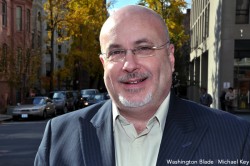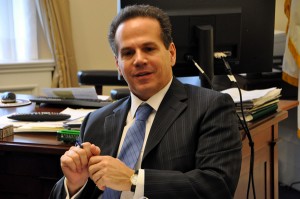National
Gay congressional candidates excel in 2Q fundraising
Baldwin rakes in $2.2 million; Tisei bests Dem incumbent

Gay and lesbian candidates running for Congress posted strong fundraising numbers in the second quarter in a year when more out contenders than ever are making bids for high office.
The Washington Blade examined the second quarter campaign finance reports for the eight candidates seeking office in the U.S. House and U.S. Senate that were endorsed by the Gay & Lesbian Victory Fund. The second quarter numbers represent fundraising for the candidates starting in April through June and were posted recently to the Federal Election Commission website.
The eight endorsed candidates are among 13 identified openly LGBT candidates pursuing seats in the House and Senate throughout the country — an unprecedented number for any election cycle.
In the most high-profile race, lesbian U.S. Senate candidate Tammy Baldwin has been doing well in fundraising in her bid to become the first openly gay U.S. senator. Baldwin took in $2.2 million during the second quarter. That means she has raised $6.7 million this cycle while spending $3.96 million and having $3.5 million in cash on hand.
Technically, she didn’t come out on top in comparison to one of her Republican opponents. Eric Hovde, a hedge fund manager who recently entered the race, posted $2,494,211 for the second quarter. But Hovde, whose net worth has been estimated at $58 million, has spent millions on his own campaign and spent $3.5 million to make his name more well known. Others in the race came out behind: former Wisconsin Gov. Tommy Thompson raised $834,000, former congressman and gubernatorial candidate Mark Neumann raised $733,450 and State Assembly Speaker Jeff Fitzgerald raised $41,033.
The race between Baldwin and her potential Republican opponents appears tight. According to data published last month from Public Policy Polling, she’s in a dead heat with Novde, who leads her 45-44, and Thompson, whom she ties 45-45. Baldwin leads Neumann by 45-41 and Fitzgerald 46-42.
Perhaps the most surprising numbers come from Richard Tisei, a gay Republican former state legislator in Massachusetts, who raised $571,371 in the second quarter in his bid to represent Massachusetts’ 6th congressional district. That means he outraised Rep. John Tierney (D-Mass.), who raised $421,944 — even though he’s an incumbent Democrat running in a heavily “blue” state.
In a statement, Tisei, who outraised Tierney in the first quarter of 2012, thanked donors.
“I am consistently impressed with the strong support I am receiving from individual donors in support of my candidacy,” Tisei said. “In my wildest dreams, I wouldn’t have imagined that so many people would be supporting our message of change with their pocketbooks — particularly in these very tough economic times.”
The fundraising numbers for the second quarter mean Tisei has raised $1,237,000 thus far this cycle, has spent $435,410 and has $802,000 in cash on hand. Comparatively, Tierney has raised $1,325,650 this cycle, has spent $820,875 and has $693,000 in cash on hand.
On Wednesday, the D.C. newspaper Roll Call shifted the status of the race from “leans Democrat” to “toss-up.” The race is becoming competitive, in part, because Tierney, an eight-term U.S House member, has been under scrutiny because of controversy involving his family. Tierney’s brother-in-law, Daniel Eremian, was convicted of federal racketeering charges related to his operation of an illegal offshore casino, and Tierney’s wife was sent to jail for tax fraud related to this operation.
Tierney has a strong pro-LGBT record in the U.S. House: he voted in favor of “Don’t Ask, Don’t Tell” repeal, hate crimes protections legislation and a version of the Employment Non-Discrimination Act in addition to voting against the Federal Marriage Amendment.
Similarly strong numbers were posted in the second quarter by Mark Pocan, a gay Wisconsin Assembly member who’s seeking to represent Wisconsin’s 2nd congressional district. Baldwin is vacating the seat to run for Senate.
But Pocan is in a different situation because he still needs to win the Democratic primary, which is set for Aug. 14, and other Democrats are seeking the nomination to represent the party in the general election. Pocan raised $250,000 in the second quarter, besting his most serious competitor, Kelda Helen Roys, another state legislator in Wisconsin, who raised $130,833.
In a statement, Pocan said he accepted contributions from more than 3,300 donors over the course of his campaign, and 80 percent of donations came in increments of $100 or less.
“I am truly grateful for the outpouring of support from the District 2 community,” Pocan said. “I’ve met and talked to voters from Beloit to Baraboo, and it’s clear my message of progressive values with real results resonates with people.”
The second quarter numbers mean Pocan has raised $734,550 over the course of his campaign, has spent $280,635 and has $454,000 in cash on hand. Meanwhile, Roys has raised $392,393, spent $130,833 and has $190,120 in cash on hand.
Not all gay candidates are faring as well. Sean Patrick Maloney, didn’t raise as much as incumbent Rep. Nan Hayworth (R-N.Y.) in his bid to represent New York’s 18th congressional district. Maloney, who in June won the Democratic primary, raised $319,000 in the second quarter, while Hayworth took in $459,000.
Tim Persico, campaign manager for Maloney, said special interests were the reason his boss didn’t raise as much as the incumbent Republican in the past few months, but said he’s still in good position to win.
“Sean Patrick Maloney doesn’t have the same profitable relationship with PACs and corporate lobbyists that brought Congresswoman Hayworth over a million dollars, but the outpouring of support from friends, family and even complete strangers has put him in a position to win,” Persico said.
Support from the LGBT community is coming from both sides in this race. Hayworth, who has a gay son, Will Hayworth, has been seen as a friend to the LGBT community since she took office at the start of last year. For example, she was among five Republicans to vote against a recent measure to reaffirm the Defense of Marriage Act when it came to the floor last month.
One of the gay U.S. House members seeking re-election — and who’s also facing a serious challenge in the primary and general election — also came out on top in fundraising last quarter. Rep. David Cicilline (D-R.I.), who last year became the newest openly gay member of Congress, raised $302,000 in the second quarter.
But his opponents aren’t too far behind. Anthony Gemma, a businessman, is Cicilline’s main challenger in the Democratic primary, which is set for Sept. 11, and raised $243,000 in the second quarter. The Republican in the race, Brendan Doherty, the Rhode Island State Police’s former superintendent, raised $221,711.
Cicilline is facing a complicated road to re-election because the city that he governed as mayor prior to winning election to the U.S. House, Providence, R.I., is facing financial problems. A report commissioned by the City Council last year blamed his administration for a lack of transparency and for making a series of moves – like tapping into Providence’s rainy-day fund – without councilors’ approval. The lawmaker apologized in April, saying he should have been more forthright about the financial condition of the city.
Polls are showing Cicilline could be in danger of losing the Democratic nomination. A poll from local TV affiliate WPRI published in May of 302 likely Democratic primary voters had Cicilline leading with 40 percent and Gemma following close behind at 36 percent — and 20 percent still undecided.
So far this cycle, Cicilline has raised $1,570,486, spent $771,723 and has $836,325 in cash on hand. At the same time, Doherty has raised $990,882, spent $321,532 and has $669,350 in cash on hand, while Gemma has raised $990,882, spent $87,071 and has $343,040 in cash on hand.
The bisexual lawmaker seeking to represent Arizona’s 9th congressional district is also coming out on top of a crowded field of a half dozen candidates seeking to win this newly created seat. Kyrsten Sinema, who’s bisexual and a state legislator, raised $367,554 in the second quarter. That’s above her most serious competitor in the primary set for Aug. 28, Andrei Cherny, who’s a former state party chair endorsed by former President Clinton. Cherny took in $301,895 during the same period.
In total this cycle, Sinema has raised $626,288, spent $267,492 and has $358,796 in cash in hand. In comparison, Cherny has raised $732,973, spent $263,913 and has $469,060 in cash on hand.
But the gay candidate didn’t come out on top in California’s 41st congressional district. Mark Takano, a school teacher and member of the Riverside Community College District’s Board of Trustees, raised $256,965, while his opponent, Riverside County Supervisor John Tavaglione, raised $337,667. Takano is seeking to become the first openly gay person of color to serve in the U.S. House in this newly created Democratic-leaning district.
So far this cycle, Takano has raised $758,156, spent $517,138 and has $241,093 in cash on hand. Meanwhile, Tavaglione has raised $790,027, spent $338,186 and has $451,991 in cash on hand.
Rep. Jared Polis (D-Colo.), who if re-elected would become the most senior openly gay member of the U.S. House, raised $59,503 in the second quarter. Those numbers put him at $848,000 in total for fundraising this cycle and leave him with $347,000 in cash on hand. An incumbent running in a safe Democratic seat, he’s not expected to face serious competition in his bid for re-election.
CORRECTION: An earlier version of this article incorrectly referred to Rep. Nan Hayworth as Nan Hunter. The name of Tim Persico was also misspelled. The Blade regrets the error.

The Comings & Goings column is about sharing the professional successes of our community. We want to recognize those landing new jobs, new clients for their business, joining boards of organizations and other achievements. Please share your successes with us at [email protected].
Congratulations to Gil Pontes III on his recent appointment to the Financial Advisory Board for the City of Wilton Manors, Fla. Upon being appointed he said, “I’m honored to join the Financial Advisory Board for the City of Wilton Manors at such an important moment for our community. In my role as Executive Director of the NextGen Chamber of Commerce, I spend much of my time focused on economic growth, fiscal sustainability, and the long-term competitiveness of emerging business leaders. I look forward to bringing that perspective to Wilton Manors — helping ensure responsible stewardship of public resources while supporting a vibrant, inclusive local economy.”
Pontes is a nonprofit executive with years of development, operations, budget, management, and strategic planning experience in 501(c)(3), 501(c)(4), and political organizations. Pontes is currently executive director of NextGen, Chamber of Commerce. NextGen Chamber’s mission is to “empower emerging business leaders by generating insights, encouraging engagement, and nurturing leadership development to shape the future economy.” Prior to that he served as managing director of The Nora Project, and director of development also at The Nora Project. He has held a number of other positions including Major Gifts Officer, Thundermist Health Center, and has worked in both real estate and banking including as Business Solutions Adviser, Ironwood Financial. For three years he was a Selectman, Town of Berkley, Mass. In that role, he managed HR and general governance for town government. There were 200+ staff and 6,500 constituents. He balanced a $20,000,000 budget annually, established an Economic Development Committee, and hired the first town administrator.
Pontes earned his bachelor’s degree in political science from the University of Massachusetts, Dartmouth.
Kansas
ACLU sues Kansas over law invalidating trans residents’ IDs
A new Kansas bill requires transgender residents to have their driver’s licenses reflect their sex assigned at birth, invalidating current licenses.

Transgender people across Kansas received letters in the mail on Wednesday demanding the immediate surrender of their driver’s licenses following passage of one of the harshest transgender bathroom bans in the nation. Now the American Civil Liberties Union is filing a lawsuit to block the ban and protect transgender residents from what advocates describe as “sweeping” and “punitive” consequences.
Independent journalist Erin Reed broke the story Wednesday after lawmakers approved House Substitute for Senate Bill 244. In her reporting, Reed included a photo of the letter sent to transgender Kansans, requiring them to obtain a driver’s license that reflects their sex assigned at birth rather than the gender with which they identify.
According to the reporting, transgender Kansans must surrender their driver’s licenses and that their current credentials — regardless of expiration date — will be considered invalid upon the law’s publication. The move effectively nullifies previously issued identification documents, creating immediate uncertainty for those impacted.
House Substitute for Senate Bill 244 also stipulates that any transgender person caught driving without a valid license could face a class B misdemeanor, punishable by up to six months in jail and a $1,000 fine. That potential penalty adds a criminal dimension to what began as an administrative action. It also compounds the legal risks for transgender Kansans, as the state already requires county jails to house inmates according to sex assigned at birth — a policy that advocates say can place transgender detainees at heightened risk.
Beyond identification issues, SB 244 not only bans transgender people from using restrooms that match their gender identity in government buildings — including libraries, courthouses, state parks, hospitals, and interstate rest stops — with the possibility for criminal penalties, but also allows for what critics have described as a “bathroom bounty hunter” provision. The measure permits anyone who encounters a transgender person in a restroom — including potentially in private businesses — to sue them for large sums of money, dramatically expanding the scope of enforcement beyond government authorities.
The lawsuit challenging SB 244 was filed today in the District Court of Douglas County on behalf of anonymous plaintiffs Daniel Doe and Matthew Moe by the American Civil Liberties Union, the ACLU of Kansas, and Ballard Spahr LLP. The complaint argues that SB 244 violates the Kansas Constitution’s protections for personal autonomy, privacy, equality under the law, due process, and freedom of speech.
Additionally, the American Civil Liberties Union filed a temporary restraining order on behalf of the anonymous plaintiffs, arguing that the order — followed by a temporary injunction — is necessary to prevent the “irreparable harm” that would result from SB 244.
State Rep. Abi Boatman, a Wichita Democrat and the only transgender member of the Kansas Legislature, told the Kansas City Star on Wednesday that “persecution is the point.”
“This legislation is a direct attack on the dignity and humanity of transgender Kansans,” said Monica Bennett, legal director of the ACLU of Kansas. “It undermines our state’s strong constitutional protections against government overreach and persecution.”
“SB 244 is a cruel and craven threat to public safety all in the name of fostering fear, division, and paranoia,” said Harper Seldin, senior staff attorney for the ACLU’s LGBTQ & HIV Rights Project. “The invalidation of state-issued IDs threatens to out transgender people against their will every time they apply for a job, rent an apartment, or interact with police. Taken as a whole, SB 244 is a transparent attempt to deny transgender people autonomy over their own identities and push them out of public life altogether.”
“SB 244 presents a state-sanctioned attack on transgender people aimed at silencing, dehumanizing, and alienating Kansans whose gender identity does not conform to the state legislature’s preferences,” said Heather St. Clair, a Ballard Spahr litigator working on the case. “Ballard Spahr is committed to standing with the ACLU and the plaintiffs in fighting on behalf of transgender Kansans for a remedy against the injustices presented by SB 244, and is dedicated to protecting the constitutional rights jeopardized by this new law.”
National
After layoffs at Advocate, parent company acquires ‘Them’ from Conde Nast
Top editorial staff let go last week

Former staff members at the Advocate and Out magazines revealed that parent company Equalpride laid off a number of employees late last week.
Those let go included Advocate editor-in-chief Alex Cooper, Pride.com editor-in-chief Rachel Shatto, brand partnerships manager Erin Manley, community editor Marie-Adélina de la Ferriére, and Out magazine staff writers Moises Mendez and Bernardo Sim, according to a report in Hollywood Reporter.
Cooper, who joined the company in 2021, posted to social media that, “Few people have had the privilege of leading this legendary LGBTQ+ news outlet, and I’m deeply honored to have been one of them. To my team: thank you for the last four years. You’ve been the best. For those also affected today, please let me know how I can support you.”
The Advocate’s PR firm when reached by the Blade said it no longer represents the company. Emails to the Advocate went unanswered.
Equalpride on Friday announced it acquired “Them,” a digital LGBTQ outlet founded in 2017 by Conde Nast.
“Equalpride exists to elevate, celebrate and protect LGBTQ+ storytelling at scale,” Equalpride CEO Mark Berryhill said according to Hollywood Reporter. “By combining the strengths of our brands with this respected digital platform, we’re creating a unified ecosystem that delivers even more impact for our audiences, advertisers, and community partners.”
It’s not clear if “Them” staff would take over editorial responsibilities for the Advocate and Out.


















